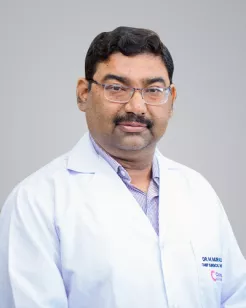Surgical oncology is a vital part of care for many patients suffering from cancer. It is a field of treatment where surgery is used to diagnose, stage and treat cancers. Surgical oncology is used to meet any of the following goals
- Remove the tumour - In cases where the tumour is contained in a single area, it is removed completely if possible.
- Removing part of the tumour - If removing the entire tumour could cause harm to the patient then, if possible a part of the tumour is removed to support better treatment outcomes.
- Ease the symptoms - Certain tumours cause pain and discomfort. Surgery is used to address this discomfort if possible.
Often, surgical oncology is offered along with chemotherapy and/or radiation therapy. This is either given before the surgery or after, based on the individual patient and type of cancer.
Depending on the type of cancer and location, the surgeries could either be minimally invasive such as laparoscopic surgery or could be open surgeries that require larger incisions. Our surgical oncologists work along with the medical oncologist, the radiation oncologist and other clinicians to aid better response to treatment, and speedy recovery from surgery.
Our expert panel of surgical oncologists uses best in class techniques to deliver superior outcomes and patient results. Sometimes organ preservation surgeries also ensure that the tumour can be removed without removing the organ or causing significant damage.
At Cancer Clinics, our integrative care team of physical therapists, nutritionists and counsellors work with the patient to offer the required care to support a quick recovery.
Our Doctors
We have some of the best specialists from around the world, they bring years of experience and offer evidence-based treatment to ensure the best care for you.
Treatments & Procedures
We provide comprehensive treatment for all types diseases under one roof. Our highly experienced doctors supported by especially trained clinical staff, ensure the best care for you.





